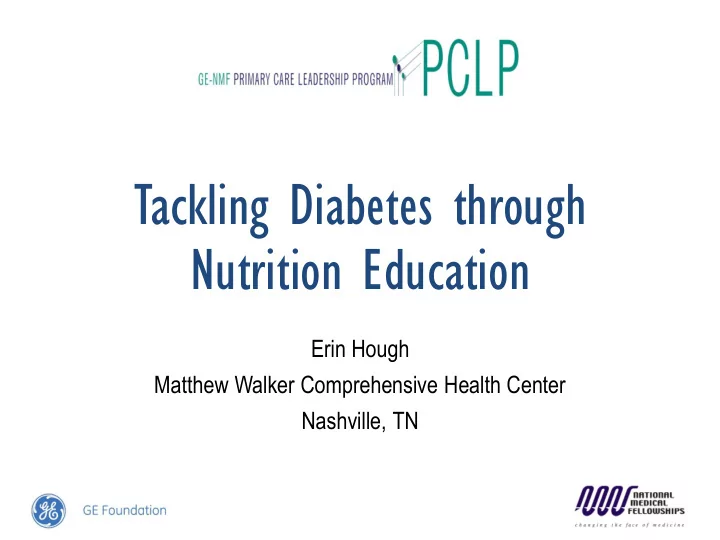

Tackling Diabetes through Nutrition Education Erin Hough Matthew Walker Comprehensive Health Center Nashville, TN
Introduction • Overview • Background, Methodology, Results, Discussion, Recommendations • Reasons for choosing project • Interest in Family Medicine • Need was expressed by the clinic
Background • Nearly 26 million American have diabetes. • 85.2% of people with type II diabetes are overweight or obese. • Several studies have shown that diabetes nutrition education will have a positive impact on patients. • Diet education • Improvements in fasting plasma glucose and HbA1C • Significant decreases in body weight and BMI
Methodology • Patient Surveys- A pre-survey was used to determine the patients’ diabetes (controlled or uncontrolled), exercise, and nutrition status. After 2 weeks a post-survey was conducted through phone call to see if a change occurred in exercise frequency and nutrition habits. • Nutrition booklet- A booklet was created for patients with diabetes (specifically type 2). It contained subsections for healthy tips, sample diet, and recipes. There was also another section for easy exercises.
Methodology
Results • 16 pre-surveys were conducted, 15 patients granted consent for a post 2 week phone survey • 5 post-surveys were conducted Weight Perception vs Actual 5 4 3 2 1 0 underweight normal overweight obese
Results
Results
Discussion • Why are patients’ perceptions of weight lower than their actual weight? • Survey results are not a proper representation of the clinic as a whole because of the low number of responses. • It was difficult to get in contact with patients by phone for the post-survey interview, thus the low number of post- surveys. • Patients may have been overwhelmed by the number of people who came to speak to/interview them before the doctor came. This may have affected how they answered.
Recommendations • Have diabetes nutrition information available to diabetic patients who may be struggling with keeping their blood glucose under control. • Possibly extend the Diabetes Clinic hours to accommodate patients who may not be able to make it on Thursday mornings for the extra education.
Conclusion • Diabetes is a prevalent issue in the United States. • Diet and nutrition education is important in combatting the disease. • Diabetes nutrition booklets may be helpful in educating patients on following a healthy diet and exercise plan. • Improvements in eating habits were shown in the patients that completed the post-survey.
Acknowledgements • Dr. Joyce Semenya, MD- preceptor • Dr. Michele Williams, MD- site supervisor • Dr. Dana Marshall, PhD- faculty
Recommend
More recommend